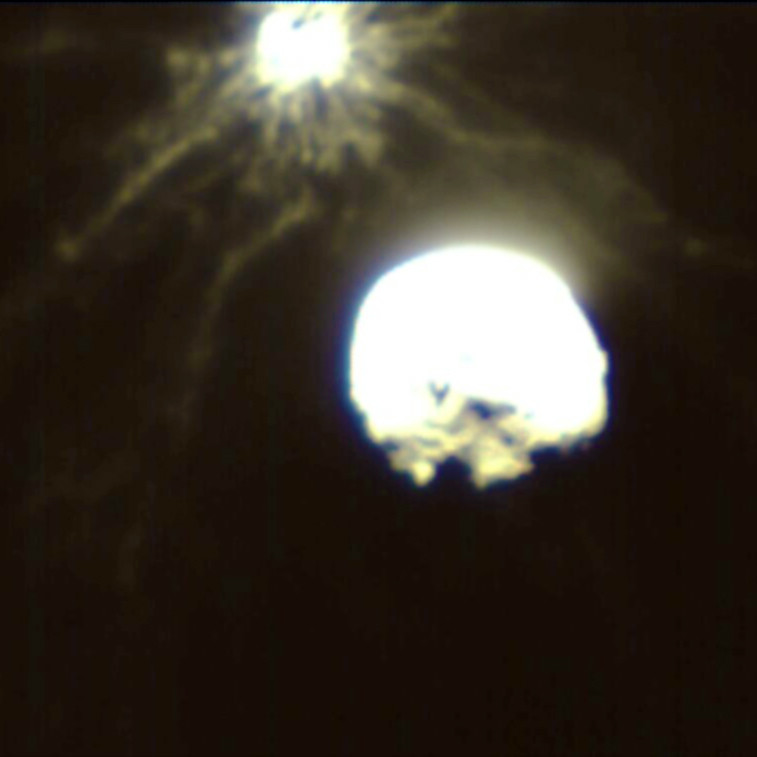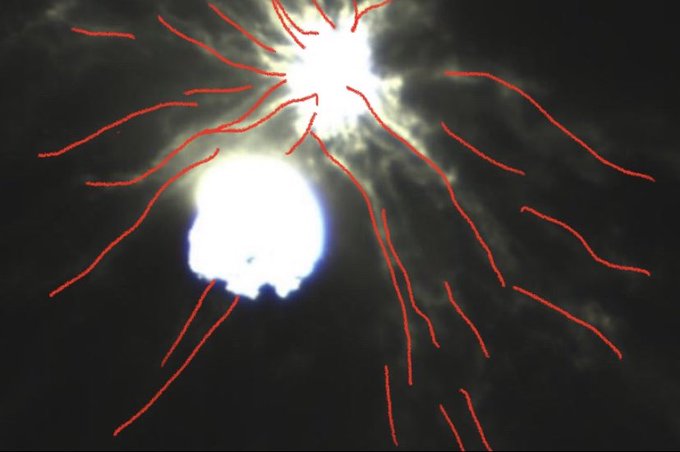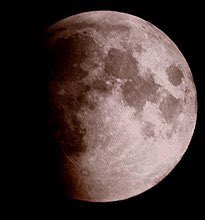Page 1 of 1
APOD: DART Asteroid Impact from Space (2022 Sep 29)
Posted: Thu Sep 29, 2022 4:05 am
by APOD Robot
 DART Asteroid Impact from Space
Explanation: Fifteen days
DART Asteroid Impact from Space
Explanation: Fifteen days before impact, the DART spacecraft deployed a small companion satellite to document its historic
planetary defense technology demonstration. Provided by the Italian Space Agency, the Light Italian CubeSat for Imaging Asteroids, aka LICIACube,
recorded this image of the event's aftermath. A cloud of ejecta is seen near the right edge of the frame captured only minutes
following DART's impact with target asteroid Dimorphos while LICIACube was about 80 kilometers away. Presently about 11 million kilometers from Earth, 160 meter diameter Dimorphos is a moonlet orbiting 780 meter diameter asteroid Didymos. Didymos is seen off center in the LICIACube image. Over the coming weeks, ground-based telescopic observations will look for a small change in Dimorphos' orbit
around Didymos to
evaluate how effectively the DART impact deflected its target.
Re: APOD: DART Asteroid Impact from Space (2022 Sep 29)
Posted: Thu Sep 29, 2022 4:41 am
by FLPhotoCatcher
Too bad it's so blurry. I've heard that a clearer pic may be available.
Here's a link to a video about it.
https://www.youtube.com/watch?v=hg4DiOmKlVM
Re: APOD: DART Asteroid Impact from Space (2022 Sep 29)
Posted: Thu Sep 29, 2022 4:49 am
by AVAO
APOD Robot wrote: ↑Thu Sep 29, 2022 4:05 am
 DART Asteroid Impact from Space
Explanation: Fifteen days
DART Asteroid Impact from Space
Explanation: Fifteen days before impact, the DART spacecraft deployed a small companion satellite to document its historic
planetary defense technology demonstration. Provided by the Italian Space Agency, the Light Italian CubeSat for Imaging Asteroids, aka LICIACube,
recorded this image of the event's aftermath. A cloud of ejecta is seen near the right edge of the frame captured only minutes
following DART's impact with target asteroid Dimorphos while LICIACube was about 80 kilometers away. Presently about 11 million kilometers from Earth, 160 meter diameter Dimorphos is a moonlet orbiting 780 meter diameter asteroid Didymos. Didymos is seen off center in the LICIACube image. Over the coming weeks, ground-based telescopic observations will look for a small change in Dimorphos' orbit
around Didymos to
evaluate how effectively the DART impact deflected its target.
I wonder why the flight of the thrown materials sometimes shows large wavy lines?
 Original Image Credit: ASI/NASA
Original Image Credit: ASI/NASA
Re: APOD: DART Asteroid Impact from Space (2022 Sep 29)
Posted: Thu Sep 29, 2022 6:44 am
by MarkE
I'm sure they've took into consideration that blasting the smaller object off its current trajectory will also effect the larger objects trajectory given the two are gravitationally bound to one another
Re: APOD: DART Asteroid Impact from Space (2022 Sep 29)
Posted: Thu Sep 29, 2022 6:47 am
by MarkBour
AVAO wrote: ↑Thu Sep 29, 2022 4:49 am
...
I wonder why the flight of the thrown materials sometimes shows large wavy lines?
 Original Image Credit: ASI/NASA
Original Image Credit: ASI/NASA
Actually, I would refer you to the Scott Manley YouTube video linked just above by FLPhotoCatcher:
It's
all good, but particularly at about 07:30 of the video he talks about the wavy ejecta lines and gives reasoning for them that I find very plausible.
Re: APOD: DART Asteroid Impact from Space (2022 Sep 29)
Posted: Thu Sep 29, 2022 1:48 pm
by orin stepanek
So we hit Dimorphos; but it stays in orbit around Didymos! What
good does that do if Didymos doesn't change it's orbit?

Webb, Hubble Capture Detailed Views of DART Impact
Posted: Thu Sep 29, 2022 3:22 pm
by bystander
Webb, Hubble Capture Detailed Views of DART Impact
NASA | GSFC | STScI
Hubble /
Webb | ESA
Hubble /
Webb | 2022 Sep 29
wo of NASA’s Great Observatories, the James Webb Space Telescope and the Hubble Space Telescope, have captured views of a unique NASA experiment designed to intentionally smash a spacecraft into a small asteroid in the world’s first-ever in-space test for planetary defense. These observations of NASA’s Double Asteroid Redirection Test (DART) impact mark the first time that Webb and Hubble simultaneously observed the same celestial target.
On September 26, 2022 at 7:14 pm EDT,
DART intentionally crashed into Dimorphos, the asteroid moonlet in the double-asteroid system of Didymos. It was the world’s first test of the kinetic impact mitigation technique, using a spacecraft to deflect an asteroid that poses no threat to Earth, and modifying the object’s orbit. DART is a test for defending Earth against potential asteroid or comet hazards.
The coordinated Hubble and Webb observations are more than just an operational milestone for each telescope – there are also key science questions relating to the makeup and history of our solar system that researchers can explore when combining the capabilities of these observatories. ...
Re: APOD: DART Asteroid Impact from Space (2022 Sep 29)
Posted: Thu Sep 29, 2022 7:00 pm
by Guest
Any guess as to what percentage of the ejecta mass from Dimorphos has escape velocity from Dimorphos?
Re: APOD: DART Asteroid Impact from Space (2022 Sep 29)
Posted: Thu Sep 29, 2022 9:21 pm
by johnnydeep
orin stepanek wrote: ↑Thu Sep 29, 2022 1:48 pm
dart-zoom_bkg-nologos1_0.jpg
So we hit Dimorphos; but it stays in orbit around Didymos! What
good does that do if Didymos doesn't change it's orbit?

My understanding is that the goal here was only to change Dimorphos' orbit, not Didymos. It's purely the first proof of concept test on something very small whose orbit is also small, fast, and easily measured. My guess is that they certainly
could have impacted Didymos, but maybe the small size of the impactor wouldn't have changed its orbit enough to be easily measurable as certainly due to the impact as opposed to other extraneous factors outside NASA's control.
Re: APOD: DART Asteroid Impact from Space (2022 Sep 29)
Posted: Thu Sep 29, 2022 10:46 pm
by VictorBorun
johnnydeep wrote: ↑Thu Sep 29, 2022 9:21 pm
orin stepanek wrote: ↑Thu Sep 29, 2022 1:48 pm
dart-zoom_bkg-nologos1_0.jpg
So we hit Dimorphos; but it stays in orbit around Didymos! What
good does that do if Didymos doesn't change it's orbit?

My understanding is that the goal here was only to change Dimorphos' orbit, not Didymos. It's purely the first proof of concept test on something very small whose orbit is also small, fast, and easily measured. My guess is that they certainly
could have impacted Didymos, but maybe the small size of the impactor wouldn't have changed its orbit enough to be easily measurable as certainly due to the impact as opposed to other extraneous factors outside NASA's control.
what makes Dimorphos so special is that it is a satellite and that Didymos' gravitation well is shallow.
So a weak punch makes a measurable shift of Dimorphos' orbit around Didymos.
What makes the idea blurry is that the impact ejecta may amplify the punch by 3-5 times or may not.
Even after we find out the effect of the ejecta shown in this APOD, we still will not know how predictable the punch technique is
Re: APOD: DART Asteroid Impact from Space (2022 Sep 29)
Posted: Thu Sep 29, 2022 10:52 pm
by VictorBorun
AVAO wrote: ↑Thu Sep 29, 2022 4:49 am
I wonder why the flight of the thrown materials sometimes shows large wavy lines?
 Original Image Credit: ASI/NASA
Original Image Credit: ASI/NASA
Those lines can't be tracks after some manoeuvring objects.
They must be jets of dust and rubbles, coming from some hot spots after the punch.
Those hot spots may well be unstable jet sources
Re: APOD: DART Asteroid Impact from Space (2022 Sep 29)
Posted: Fri Sep 30, 2022 4:50 am
by MarkBour
LOL. I put "DART NASA mission" into Google on a Chromium browser and got a rather unusual, animated result.
Re: APOD: DART Asteroid Impact from Space (2022 Sep 29)
Posted: Fri Sep 30, 2022 10:47 am
by XgeoX
Man they really punched the crap out of that asteroid!
Eric
Re: APOD: DART Asteroid Impact from Space (2022 Sep 29)
Posted: Sat Oct 01, 2022 8:04 pm
by VictorBorun
AVAO wrote: ↑Thu Sep 29, 2022 4:49 am
I wonder why the flight of the thrown materials sometimes shows large wavy lines?
 Original Image Credit: ASI/NASA
Original Image Credit: ASI/NASA
Just found out how wrong could I have been.
The dusty lanes

can well form in the flight with the friction if the fraction of smaller particles moves through the fraction of larger particles.
They
say the ray lanes around a Lunar impact crater, Tycho, is an evidence

Re: APOD: DART Asteroid Impact from Space (2022 Sep 29)
Posted: Thu Oct 27, 2022 4:05 am
by Mathew32df
Sorry but the photo is a bit blurry, do you have a clearer picture?
Re: APOD: DART Asteroid Impact from Space (2022 Sep 29)
Posted: Thu Oct 27, 2022 12:25 pm
by johnnydeep
Mathew32df wrote: ↑Thu Oct 27, 2022 4:05 am
Sorry but the photo is a bit blurry, do you have a clearer picture?
Apparently, that's as good as it's going to get. It was taken by the LICIACube CubeSat craft which was part of the hardware assemblage of the larger DART spacecraft.
https://en.wikipedia.org/wiki/LICIACube wrote:
LICIACube
Light Italian CubeSat for Imaging of Asteroids (LICIACube, IPA: [ˈli.t͡ʃi.əˌkjuːb][1]) is a six-unit CubeSat of the Italian Space Agency (ASI). LICIACube is a part of the Double Asteroid Redirection Test (DART) mission and carries out observational analysis of the Didymos asteroid binary system after DART's impact on Dimorphos. It communicates directly with Earth, sending back images of the ejecta and plume of DART's impact as well as having done asteroidal study during its flyby of the Didymos system from a distance of 56.7 km (35.2 mi), 165 seconds after DART's impact.[2]
...
Scientific payload
LICIACube is equipped with two optical cameras for conducting asteroidal reconnaissance during flyby, dubbed LEIA (LICIACube Explorer Imaging for Asteroid), a Catadioptric camera, a narrow field of view (FoV) of 2.06°, 25 microradian/pixel, 2048x2048 pixels, monochrome, achieving a best resolution of 1.38 m/pix at closest approach) camera, and LUKE (LICIACube Unit Key Explorer), a wide 5° FoV imaging camera with an RGB Bayer pattern infrared filter. These captured scientific data revealing the composition of the asteroid and provided data for its autonomous system by finding and tracking the asteroid throughout the encounter. As it was released when DART sped up for its intentional impact, it took an image every 6 seconds during DART's impact period. It had preliminary flyby targets including taking 3 high resolution images revealing the asteroid's morphology concentrating on the physics of the asteroid and plume generations after impact. This may help characterise the consequences of the impact.[4]
I might have hoped the imaging system on LICIACube could have produced a better image, but I guess it can't. Why? I'll leave that to be answered by those more knowledgeable than I am. But even the images of Dimorphos taken by the larger DART impact craft while approaching Dimorphos before impact only became really clear when it got
really close.
 DART Asteroid Impact from Space
DART Asteroid Impact from Space


